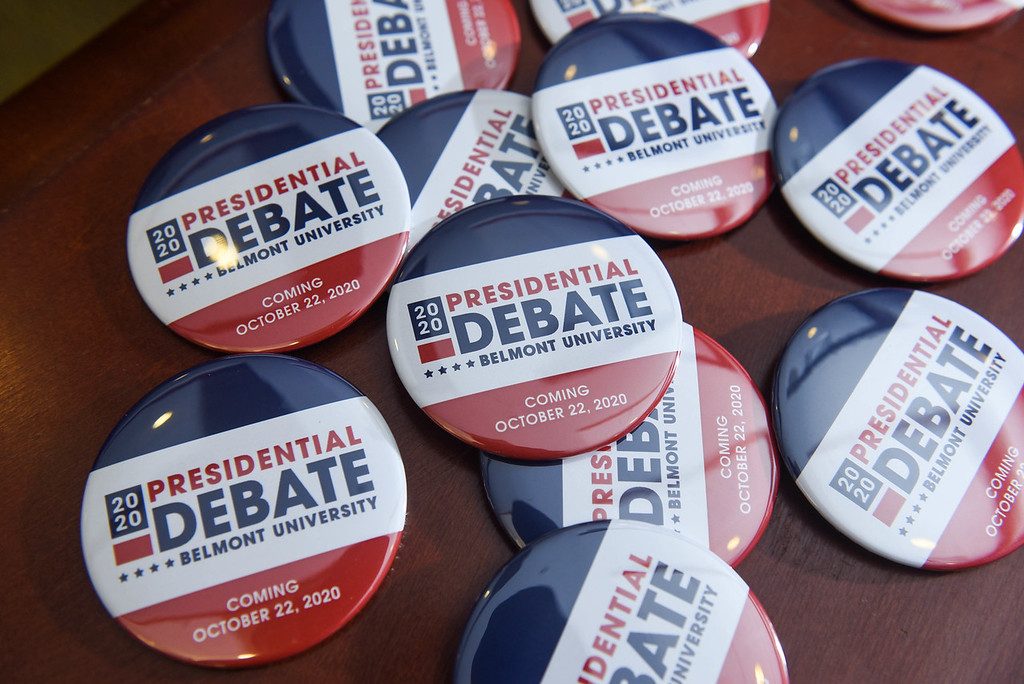Biden and Trump square off in second and final presidential debate
Biden and Trump square off in second presidential debate

Thursday marked the second and last of the presidential debates for the 2020 election cycle.
With three debates initially slated for the final weeks of the election, the second was set to be done remotely due to the president’s coronavirus diagnosis but was canceled when the Trump campaign declined to participate virtually. After much contention, the two candidates came together again on Thursday for one final opportunity to speak to the American people.
The second debate began with a notably calm tenor. Each candidates’ microphones were muted during his opponent’s opening answers so that only one could speak at a time. Many Syracuse University students tuned into the debate, including public relations sophomore Sydney Schroeder. Schroeder took note of the candidates’ dispositions, with Biden appearing more aggressive and Trump reserved relative to the last debate.
“Biden took more of an offensive than I thought [he would] and it helped,” Schroeder said. “I’m surprised that Trump didn’t get more aggressive since that’s what his supporters like.”
The first topic, the COVID-19 pandemic, showed both candidates pursuing clear strategies. Trump focused on the economy, the promise of a vaccine, and an assurance that the coronavirus is waning. The president said, “We’re rounding the turn, we’re rounding the corner. It’s going away.”
Trump’s approach contrasted with Biden’s more plan-focused response, which emphasized Trump’s short-comings. When Trump said that Americans were learning to live with the virus, Biden countered, “People are learning to die with it.”
The next segment focused on national security, leading with a question on foreign election interference. Biden was asked about his son Hunter’s involvement with Ukraine and Trump was questioned about his Chinese bank account.
As the questions grew more personal, so did the answers. A broad national security question was re-routed to the legality of Trump’s tax returns. Biden articulated multiple times that intelligence agencies had cleared him and his son of any wrongdoing. Trump denied outright that anything he had done in China was unethical. In regards to his Chinese bank account, Trump said, “I was just a businessman doing business.”
President Trump on Chinese bank account: "I have many bank account and they're all listed and they're all over the place. I was a business man doing business."#Debates2020 #debates
Full video: https://t.co/GMx4T2yMxi pic.twitter.com/Fg863E8K0a
— CSPAN (@cspan) October 23, 2020
Chris Bezdedenanu, policy studies and citizenship and civic engagement sophomore, sensed Trump’s tone shift at this point.
“Forty-five minutes in, we are now seeing Trump start to revert back to his usual self,” Bezdedenanu said.
The third topic was American families, with questions focusing on healthcare, minimum wage, immigration and pandemic relief. President Trump began with jabs at the Affordable Care Act and insisted Biden wanted socialized medicine. Trump brought up Senator Bernie Sanders multiple times to assert that Joe Biden supported socialized medicine. In response, Biden said, “I beat all of those other people because I disagreed with them.”
Trump also came out firmly against Biden’s proposal for a $15 minimum wage. Communication and rhetorical studies junior, Daisy Wright said, “I truly do not understand why you would be opposed to requiring your citizens have access to the bare minimum of a living wage.”
Race in America was the next topic. When asked about “the talk,” the conversation many Black parents have to have with their children about interacting with police, Biden noted the differences between interacting with police as a white child versus as a Black child. Trump brought up the 1994 crime bill and Biden responded by rehashing several of the times Trump has gotten in trouble for making racially insensitive comments. Despite this, President Trump said, “I don’t care who’s in the audience. I’m the least racist person in this room.”
The fifth topic was climate change, which gave Biden the opportunity to discuss his climate plan. Trump’s approach stayed far more focused on maintaining the economic status quo. Trump also asked Biden why, when he was vice president, he failed to achieve his goals on climate. This was a strategy Bezdedenanu said the president employed consistently throughout the night.
The final question asked both candidates if they win the election, what will they say at their inauguration to those Americans who didn’t vote for them. Trump’s focus remained firmly on revitalizing the economy, for the third time in his tenure by his estimate. Biden’s closing remarks emphasized an all-American unity and an appeal to bipartisanship.
Watch President Trump and former Vice President Joe Biden answer the final #Debates2020 question: "At your inauguration, what will you say to Americans who did not vote for you?"
Full video: https://t.co/GMx4T2yMxi pic.twitter.com/6gvtiRT9nu
— CSPAN (@cspan) October 23, 2020
Political science and citizenship and civic engagement senior Hailey Schector said she appreciated the calmer debate, though she didn’t think this change in tone yielded a more productive discussion.
“I was for sure disappointed,” Schector said. “I feel like Trump deflected a lot of questions by pushing back against Biden, specifically his vice presidency. They did talk more specifically about policy but I feel like it was super repetitive. I have followed this presidential race very closely and can’t say I’ve learned anything new about either candidate.”
Trump started off strong, Bezdedenanu said, but reverted back to his “usual self and tactics.” He said Biden’s performance has been consistent.
Bezdedenanu said, “Trump was the one who needed this debate more than Biden did, but with a lackluster performance against a strong challenger, it may have been too little too late.”





